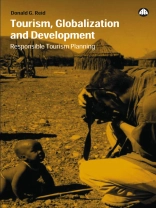Tourism is booming world wide – it makes up a massive part of the global economy. Donald G. Reid’s book focuses on tourism in developing and less-developed countries. He examines its social and environmental impact and offers a timely critical analysis of the part it plays in globalisation.
Many of the world’s poorest countries rely on the tourist trade for the major part of their income. However, all too often, the local communities involved do not reap the benefits of this trade. Developers often exclude local communities from the initial planning and decision-making process, viewing them either as a benign resource to be exploited, or as an impediment.
This is a rigourous critique of corporate-led tourism development, which lays out alternatives for planning and control to the local communities. It argues that only in this way can the vastly differing requirements of each community be addressed, and social and environmental issues can be dealt with properly. The book includes a discussion of macro planning theory, and offers three case studies of locally controlled projects that show clearly how communities developing a tourist trade can benefit.
Tabla de materias
Introduction
1. Globalization And The Political Economy of Tourism Development
2. Tourism As A Function Of Development Studies
3. Concepts Of Tourism
4. Planning And Development Theory And Its Relation To Tourism Development
5. The Normative View Of Tourism Of Planning
6. Case Studies In Tourism Planning
7. The Integration Of Tourism In General Development
Bibliography
Index
Sobre el autor
Donald G. Reid is University Professor Emeritus at the School of Rural Planning and Development, Faculty of Environmental Design and Development, University of Guelph, Canada. He is the author of Tourism, Globalization and Development (Pluto Press, 2003).












